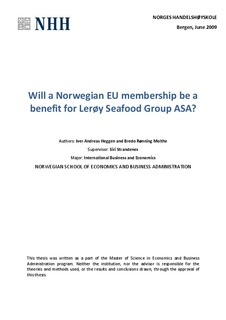| dc.description.abstract | Lerøy Seafood Group ASA (LSG) is based in Bergen and is one of Norway’s largest exporters
of fish. LSG operates companies worldwide, both inside and outside the EU. The company
has been growing strongly over the last three decades, with revenues up from approximately
100 million NOK (Norwegian kroner) in 1980 to 6057 million NOK in 2008. Sales to the EU
area represented 58.2 percent of total sales in 2008. Salmon is LSG’s most important product
and represents approximately 70 percent of the company’s total revenues.
Norway is member of the EEA agreement, which brings together the 27 EU members and the
EFTA countries (excluding Switzerland) in the “Internal Market.” However, the EEA
Agreement does not cover the EU’s Common Fisheries and Agriculture Policies, which
implies that the trade of fish does not move freely. A Norwegian EU membership would
imply a full entry into the “Internal Market” and a complete removal of all tariffs.
The first part of our analysis examines whether tariffs on Norwegian fish exports are an
important trade barrier. The empirical analysis aims at discovering whether the products
that received a tariff concession in 1993 have increased their EU share of total Norwegian
fish exports. Our findings illustrate no significant correlation. There are clear limitations to
our study, but this finding indicates that EU membership is likely to have a minor effect with
respect to a removal of tariffs. Other research both supports and opposes our findings, a fact
that undeniably illustrates the complexity of this issue.
In our discussion, we find that a change in FTA agreements due to a Norwegian EU
membership seems to be of limited importance. Antidumping countermeasures and minimal
prices forced by the EU have primarily harmed EU consumers. The industry might have
gained an economic rent because of a price markup, but on the other hand, the industry
could also have experienced increased economic risk and prevented a full utilization of its
competitiveness. Interviews with shareholders indicate few trade limitations, but do indicate
unnecessary transaction costs due to minimal prices. Furthermore, the compensation quotas
Norway received when former EFTA countries joined EU will to very little extent reduce the
potential gains from tariff removals. EU membership will result in reduced protectionism of
the agricultural industry and thus cheaper food in Norway. This implies that in the home
3
market, LSG could face increased competition from cheaper agricultural products, but one
the other hand, LSG could benefit from an increase in consumers’ real purchasing power.
If EU membership will change the export structure for Norwegian fish exporters, an
important question is whether LSG will be able to defend or increase its export share.
Market dynamics suggest more benefits than drawbacks for a large and experienced fish
company like LSG. Marketing activities provide little information on how LSG will be affected
by EU membership, but product differentiation may increase.
Poland entered the EU in 2004 and went from being a third country with a bilateral trade
agreement with the EFTA to being a part of the EU tariff union. Poland hence became a
strategic place to process fish, and it is currently the most important processing country for
Norwegian salmon. Ever since Poland’s accession, there has been a steady increase in
Norwegian fish exports in terms of both quantity and value.
Our thesis does not indicate clear benefits of a Norwegian EU membership for LSG. The
explanation behind this conclusion is that trade barriers are currently limited, Norway is
dominant player in the EU salmon market, and through the EEA agreement, Norwegian fish
exporters are already benefitting from free movements on inputs without membership.
Turning to the opposite question, whether EU membership will be an overall drawback for
LSG, we find few negative aspects. | en |
